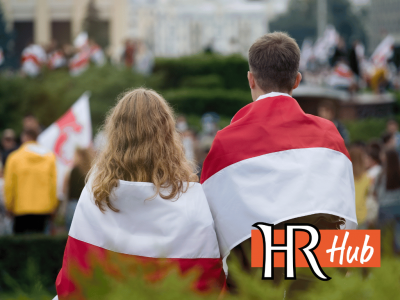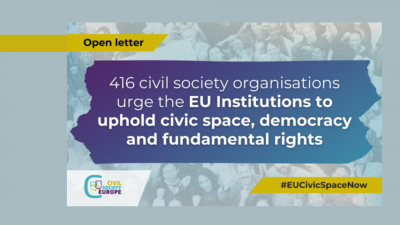
The Helsinki Foundation for Human Rights has joined the signatories of the open letter to the Federal Chancellor of Germany, Olaf Scholz, regarding the European Media Freedom Act (EMFA).
It is a letter from Polish and Hungarian organisations responding to reports of the German government's critical attitude towards the EMFA. In it, we emphasise that the European Media Freedom Act is a pioneering attempt to introduce into European Union law legal guarantees protecting media freedom from attempts by the authorities to control it, while at the same time ensuring media pluralism, editorial independence and the protection of journalists.
Warsaw, 15 May 2023
Open letter to Olaf Scholz, the Federal Chancellor of the Federal Republic of Germany
Dear Chancellor,
We are writing to you about the draft European Media Freedom Act which is currently being discussed by the European Council and in the European Parliament and which promises to become a foundation stone of media freedom in the European Union.
To our dismay, it is reported in the media and specifically in Der Spiegel that the proposal published by the European Commission last autumn is being weakened in its ability to defend media freedom in the EU by the actions of Germany in coalition with Poland and Hungary. We find this difficult to believe although der Spiegel quotes Vera Jourova, the Commission’s Vice President for values and transparency who is responsible for the Media Freedom Act, as saying “I would like to see more leadership and EU wide thinking in our largest member state”. Der Spiegel reports that Germany is afraid of the European Media Freedom Act because it fears it would lead to control of the media by the EU.
We beg to differ. The European Media Freedom Act is a pioneering attempt to insert legal safeguards into EU law to defend media freedom against attempts by governments and authorities in EU member states such as Poland and Hungary to control media, while ensuring media pluralism, editorial independence, and the protection of journalists.
Chancellor, you, yourself, in a visionary speech at Prague University on August 29, 2022, said that now is the time to “lay the corner stones of an enlarged union of freedom, security and democracy” and you added “we are supporting the Commission in its work for the rule of law”.
Media freedom is an essential pillar of the rule of law and democracy and therefore the European Media Freedom Act is crucial to the vision of an enlarged union of freedom and democracy, which you outlined in your historic Prague speech.
You also said, referring to Hungary and Poland, with whom Germany is reportedly working to weaken the impact of the European Media Freedom Act, that ”we should not shy away from using all the means at our disposal to correct failings. Surveys show that a large majority of the general public in Hungary and Poland as elsewhere actually want the EU to do more to stand up for freedom and democracy in their countries”.
It appears strange then that your country is cooperating with Hungary and Poland in the European Council negotiations over weakening the European Media Freedom Act. If this is the case, we appeal to you to review Germany’s stance on the Act and show that your country is indeed sincerely committed to the defence of democracy, which we cherish in Europe.
Sincerely yours,
Adam Bodnar, former Polish Ombudsman
Asociace Online Vyderatielia (AOU) (Czech Republic)
Association of European Journalists (AEJ Belgium)
Civil Liberties Union for Europe, Eva Simon
Center for Independent Journalism (Hungary)
Croatian Journalists Association, Maja Sever, Hrvoje Zovko (president)
The Danish Union of Journalists, Allan Boye Thulstrup (vicepresident)
The Daphne Caruana Galizia Foundation
Helsinki Foundation for Human Rights (Poland)
Hungarian Press Union, Laszlo M Lengyel
Institute of Public Affairs (ISP), Jacek Kucharczyk (Poland)
Committee for the Defence of Democracy (KOD) Kuba Karyś, chair (Poland)
Małgorzata P Bonikowska, chief editor Gazeta (Canada)
Mertek Media Monitor, Gabor Polyak, Agnes Urban, (Hungary)
OKO Press, Piotr Pacewicz, (chief editor), Michał Danielewski (deputy editor) (Poland)
Poland’s Association of Journalists and Authors of the Public Radio,
Press Club Polska, Marcin Lewicki (president)
Society of Journalists, Warsaw: Krzysztof Bobiński, Jerzy Cichowicz, Krzysztof Dowgird, Andrzej Krajewski, Marcin Majchrowski, Agnieszka Miszewska, Grażyna Olewniczak, Jan Ordyński, Jacek Parol, Janusz Wiertel
South Eastern Europe Media Organisation (SEEMO) Vienna
Adam Michnik, Editor in Chief, Gazeta Wyborcza
Marek Beylin, Rafał Zakrzewski, Piotr Stasiński, Gazeta Wyborcza
Political Freedoms Project, Pasztor Emese, Dalma Dojscak (Hungary)


